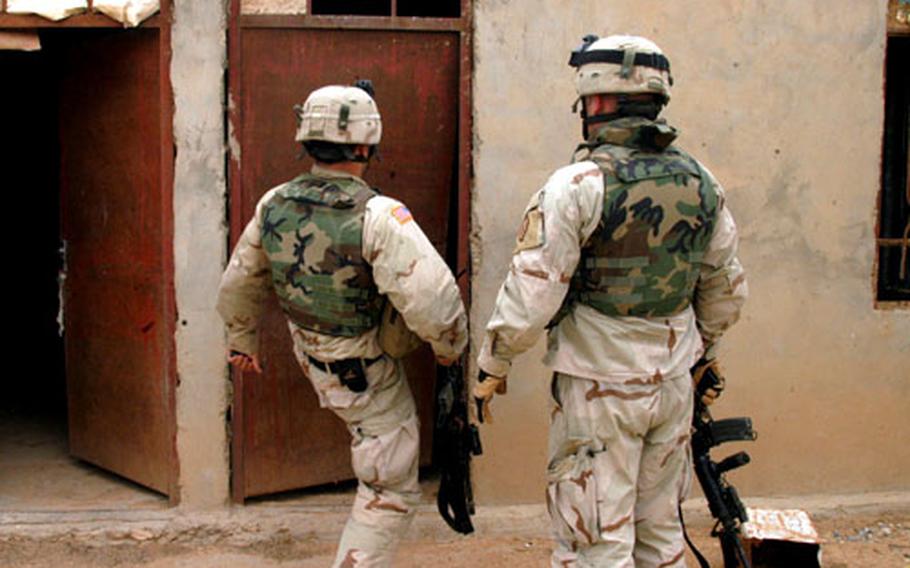
First Lt. James Upson, platoon leader of 2nd Platoon, Battery C, 2nd Battalion, 8th Field Artillery, 1st Brigade, 25th Infantry Division, kicks in a door to search a house in the Ninevah province in northwest Iraq. (Sandra Jontz / Stars and Stripes)
TAL ABTHA, Iraq — After seven months in the bowels of the war in Iraq, there’s one thing that lifts Sgt. Erik Griffin’s spirits.
“The one thing that doesn’t keep me down in the dumps is that I see progress,” said the 34-year-old soldier with Battery C, 2nd Battalion, 8th Field Artillery, 1st Brigade, 25th Infantry Division.
For example, in the former insurgent stronghold of Tal Abtha, a town of 5,000 predominately Sunni Iraqis an hour’s drive from Mosul, there’s a semifunctioning police department. While the department has plenty of trained officers, there is only one vehicle, which limits their ability to patrol.
The cops still have not grasped the concept of foot patrols, and revert to old practices of lingering at the station to wait for trouble instead of seeking it out, U.S. soldiers say.
About a month ago, insurgents planted two bombs at the Tal Abtha police station. One went off, reducing a portion to rubble.
The other bomb turned out to be a dud. No one was hurt in the overnight attack.
But the town’s market is once again open and the sale of fuel on the black market, which militants use in part to finance their insurgency, has been shut down.
Progress also is measured by the collaboration between the U.S. and Iraqi army forces.
On Wednesday, 2-8 U.S. soldiers and 102nd Iraqi Army Battalion detained 94 suspected insurgents and killed three in a firefight that ensued after they descended on the town of Aitha.
The assault didn’t come without a high price, however. Two Iraqi army soldiers were killed and two U.S. soldiers were wounded severely.
With the U.S. military clampdown on the northern city of Mosul, insurgents have been heading south and west to the vast open areas of Ninevah province, where they find safe harbor in impoverished tiny towns and villages.
Locals are at times unsuspecting accomplices, military officials say. Other residents fear U.S. troops and have sided with the insurgents. Others still are so desperate for money they accept cash in exchange for carrying out the deadliest of acts, said 1st Lt. James Upson, 25.
It’s the massive size of the province, more than 3,000 square miles, which makes patrolling so difficult for soldiers. Since the brigade arrived in October, improvement has been sluggish, but progress is progress, Griffin said.
On May 7, combined forces of U.S. soldiers and 102nd and 107th Iraqi Army Battalions cracked down on the village of Muhallabiyah, a nexus of insurgent activity where terrorists manufactured car bombs.
An explosive ordnance disposal team destroyed three ready-made car bombs, and forces detained 34 suspected insurgents.
But the soldiers don’t rest on their laurels. In fact, they don’t rest much at all.
Missions for soldiers of Battery C, for example, typically last for 12 hours or more mainly because it takes so long to drive from one objective to another. Most soldiers get by on five or six hours of sleep, if that.
On the long drives, they often pass the time talking about anything that pops into their minds. About their families, life in Iraq, near-death experiences, future plans. And there’s always a comic among them.
“I signed up for three years and I want to get out in three years,” said Pfc. Tony Gastone, 25, of Long Island. “I need to go home. I need to become president. They need me.”